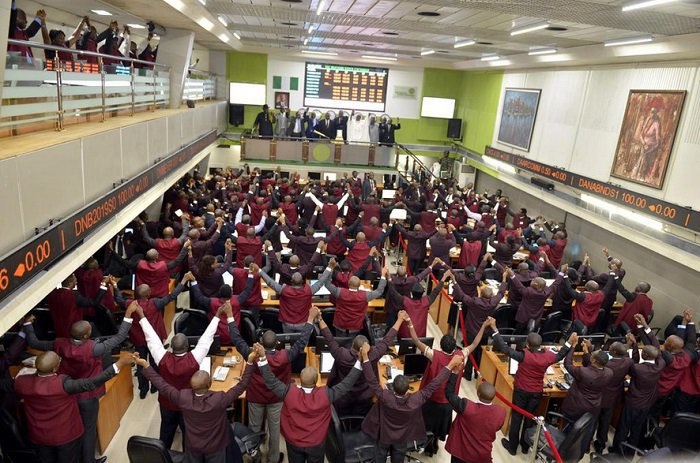- Moody’s: Nigeria’s credit challenges remain
- Analysts urge president to focus on policies to accelerate growth
Stocks listed on the Nigerian Stock Exchange (NSE) declined further Wednesday as investors appeared not to be enthusiastic about the outcome of the presidential election, which was won by the incumbent, President Muhammadu Buhari.
Precisely, while the NSE All-Share Index (ASI) fell 0.71 per cent to close lower at 32,244.24 from 32,473.82, the previous day, the market capitalisation shed N85 billion to close at N12.024 trillion.
The market had dipped by 0.57 per cent on Tuesday when some investors, who became impatient with the delay in the announcement of the results of the presidential election decided to sell, while other remained on the sidelines.
However, the negative trend continued Wednesday as the NSE ASI declined further with 30 stocks depreciating, compared with only 10 stocks that appreciated.
The Independent National Electoral Commission (INEC) announced Buhari as the winner of the presidential election, thus securing his second-term as president.
However, following his re-election for another term of four years, financial market analysts have advised the president to focus on major economic reforms in order to stimulate growth in the economy.
This is just as Moody’s Investor Service, one of the global rating agencies, in reaction to the election outcome, pointed out that Nigeria’s credit challenges have not reduced.
Speaking with THISDAY Wednesday, a professor of finance and capital market at the Nasarawa State University, Prof. Uche Uwaleke, said the president’s agenda should revolve around the three pillars on which his administration’s transformation agenda was anchored.
According to him, tackling corruption and insecurity- both of which had negatively impacted the economy in the last four years, should be the focus of Buhari’s second term.
He said: “The president’s agenda should continue to revolve around the three pillars on which the government’s transformation agenda is anchored.
“He should intensify efforts at tackling corruption and insecurity – two key factors that negatively impact the economy, especially the farmers-herders conflict, which shuts out agricultural output and drives up inflation rate.
“The president should look beyond his party in assembling a strong cabinet and economic team to drive the next level agenda with a focus on job creation.”
But the Vice President of Moody’s, Aurelien Mali, in a note to THISDAY, stated that “Nigeria’s credit challenges remain and include a low growth environment, very high exposure to fluctuations in oil prices of government revenues and export earnings, weak institutions, and high levels of corruption.”
Also, analysts at Lagos-based CSL Stockbrokers Limited, noted that in his second-term, President Buhari is faced with accelerating economic growth amid a tight fiscal environment, repressing insurgency and terrorism that has bedevilled the northern region for up to a decade.
“Following his re-election, we do not envisage significant changes in macro-economic fundamentals. We also believe that changes in the business environment will be muted.
“Hence, we do not anticipate a significant growth in job opportunities. In addition, we expect the government to continue borrowing aggressively to finance its infrastructure development plans in the wake of constrained revenues,” the firm stated.
In his contribution, the Chief Executive Officer, Eczellon Capital, Mr. Diekola Onaolapo, anticipated that the next four years would be characterised by the implementation of some of the key economic tenets of the Economic Recovery and Growth Plan (ERGP), increased pressure on tax defaulters as the government aims to increase the tax revenue of the country and also, the conceptualisation and implementation of policies which would improve the country’s Ease of Doing Business ranking.
“We also expect to see more direct market intervention or social improvement strategies like the MarketMoni and TraderMoni.
“On the effects on the debt and capital market, we expect that investors will return to the nation’s financial market,” he added.
The Group Managing Director, VFD Group Plc, Mr. Nonso Okpala, said most players in the business community would want to see good governance, conducive business environment, increased security and the rule of law.
“We would consistently support initiatives that would ensure that we get good environment to run our business,” Okpala said.
The CEO, Cowry Assets Management Limited, Johnson Chukwu, while speaking on AriseTV yesterday, said: “One expects that given that political uncertainty has been lifted, most of the economic indicators would begin to show some recovery.
“At the minimum, we should expect some level of stability after the election results have been announced.
“The fact the government in the first four years was welfarist does not mean the government would continue to be welfarist.
“I think the government should seat back, review and analyse its economic policies and I expect more rigour in terms of economic focus in this government.”
On their part, analysts at Coronation Merchant Bank, stated that the APC’s renewed majority in the Senate is significant, adding that the Senate proved frustrating to Buhari’s agenda in his first term.
The firm anticipated that the budget would be passed quickly this year.
“Nigeria will almost certainly continue with a managed exchange rate. High economic growth rates were not a feature of the last APC administration. That said, the trend in non-oil GDP growth, evident in recent data, suggests that the economy is doing better than earlier thought. As we argued in January, we believe that under such conditions there is upside risk in bank stocks,” it added.











